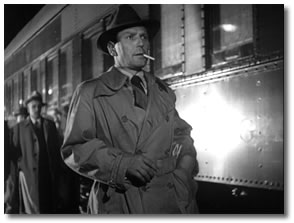 You won't find the Siren saying much of anything good about the Hays Code, but the ban on profanity meant the genre carries some of the best, most creative slang and insults in the annals of American art. My favorite in The Narrow Margin: "[She's a] 60-cent special. Cheap, flashy and strictly poison under the gravy." Other choice morsels include "You make me sick" and the response "well, use your own sink!" as well as "you cheap badge-pusher!" (Sounds great, but what does it mean? How does a cop push a badge? Into a crook's face? But that is usually more of a flash. Possibly the Hays Office heard "badge flasher" and said "you've got to be kidding.")
You won't find the Siren saying much of anything good about the Hays Code, but the ban on profanity meant the genre carries some of the best, most creative slang and insults in the annals of American art. My favorite in The Narrow Margin: "[She's a] 60-cent special. Cheap, flashy and strictly poison under the gravy." Other choice morsels include "You make me sick" and the response "well, use your own sink!" as well as "you cheap badge-pusher!" (Sounds great, but what does it mean? How does a cop push a badge? Into a crook's face? But that is usually more of a flash. Possibly the Hays Office heard "badge flasher" and said "you've got to be kidding.")The setting is a train, so the Siren was inclined to like the movie anyway, since she has a weakness for train pictures of any kind. It was a B picture, but it is class all the way. Marie Windsor, the aforementioned 60-cent special, stars as the wife of a dead mobster, and flinty, growling, shovel-faced Charles McGraw plays the cop who's escorting her to testify in a big racketeering trial. Windsor is just amazing, so tough you could use her to upholster a couch, sashaying around in her floozywear and snarling over everything from the gangsters who want her dead to the cop's failure to bring her breakfast in a timely manner. (Interesting interview with her here.)

McGraw does particularly well showing his character's disgust at his charge. You can see him throwing himself into the pure gamemanship of protection, as he fights to avoid thinking about her utter worthlessness. The supporting cast is equally good, including Paul Maxey as a rotund and enigmatic passenger and Gordon Gebert as a small child with the kind of vocal power you associate with episodes of "Nanny 911."
More than most pictures of the era, the movie captures the grubbiness and claustrophobia of a passenger train. People drift up and down the corridors, nosing around in things that are none of their business and harrassing the overworked porters and conductor. The train speeds up, slows down, picks the worst moments to lurch around and knock everyone off balance. The set was stationary in order to save money, but director Richard Fleischer and cinematographer George E. Diskant made a virtue of that by using camera to suggest the train's movement. They used a lot of hand-held work that gives an added feeling of reality. Scenes are lit in a natural-looking way, including a nice sequence at a rather seedy station, shot entirely in bright daylight. There's no soundtrack either, just the whistles and rattles of the train.
There is a twist at the end, but before the Siren gave it away she'd go into Witness Protection herself. The one flaw, however, is that after you've seen the movie you realize there are several things that just don't make any sense. Doesn't matter when you're watching it, however. The Narrow Margin is so entertaining you don't care. And there are compensations, in that you also realize the theme was spelled out quite early, and developed with admirable consistency throughout.
Plus, the film moves too swiftly for much analysis while you're watching. The Narrow Margin doesn't dawdle.
(Top, Marie Windsor shows off her taste in costume jewelry to cops Charles McGraw (left) and Don Beddoe (right). Below, McGraw demonstrates how to wear a trenchcoat.)
Không có nhận xét nào:
Đăng nhận xét